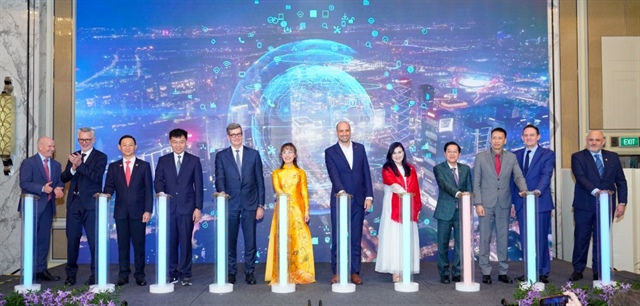Cheap credit packages raise doubts among lenders
Cheap credit packages raise doubts among lenders
Eximbank has shocked other bankers and businesses when announcing the credit program which offers to lend to businesses at the surprisingly low interest rate of 7 percent per annum. However, the super-cheap capital package has raised doubts among businesses.
Thanh Nien has cited the latest report by the State Bank of Vietnam, reporting that the current lending interest rates are between 14 and 16.5 percent on the market. The lowest interest rates are now 16-18 percent for medium and long term loans, and 12 percent for short term.
While a lot of businesses complain that they cannot access the loans at the low interest rate of 12 percent per annum, Eximbank has unexpectedly announced the credit packages with the reference interest rate of 7 percent per annum.
Those, who join the program, would have to sign a contract, committing to bear the exchange rate fluctuation of 3 percent at maximum (in case the dollar price increases by 3 percent by the end of the year). In case the exchange gap is higher than 3 percent (the dollar price increases by more than 3 percent), Eximbank would bear the excessive increase.
Eximbank has reported that 1200 billion dong worth of capital of the program has been disbursed just within a week.
Similarly, ACB has reportedly disbursed 2 trillion dong under the program of providing credit packages with the dong interest rate of 8 percent. With the packages, borrowers would have to bear the exchange rate fluctuation risks, if they occur.
However, Lao dong has quoted its sources as saying that the announced low interest rates turn out to be relatively high. As the interest rate has been set up at 7 percent per annum, borrowers would have to pay the interest rate of 3.5 percent for six month loan.
If counting on the exchange rate fluctuation of 3 percent, borrowers would have to pay 3.5 + 3 percent in total to the banks, which means 13 percent per annum. In case clients want longer term loans, the interest rates they have to pay would be even higher than 13 percent.
Eximbank’s General Director Truong Van Phuoc said on Tien phong that in order to obtain low cost capital, Eximbank has converted its capital in foreign currencies into dong to lend in dong. Phuoc has also pointed out that the above said way of calculation is not reasonable. In case the dollar price keeps stable and does not increase, borrowers would bear the low interest rate of 7 percent only. This means that in case the dong/dollar exchange rate keeps stable, the credit program would benefit borrowers.
Bankers and experts have different opinions about the move of Eximbank.
Dr Le Tham Duong from the HCM City Banking University has raised a question why the bank does not provide dollar loans to businesses at the interest rates of 6-6.5 percent, but it has to convert dollars into dong to lend in dong at the interest rate of 7 percent.
And Duong has come to a conclusion that by doing this, the bank has been trying to dodge the laws to lend in dollars. Under the current regulations, borrowers have to meet a lot of requirements to be eligible for borrowing in dollars. Therefore, banks and businesses need to apply some “trifling skills” to be able to access low-cost bank loans.
While some analysts have warned that the credit packages of Eximbank would put pressure on the dong/dollar exchange rate, because banks would have to buy dollars when the credit contracts fall due, others have affirmed that the profuse dollar supply would help keep the exchange rate stabilized.
vietnamnet






















